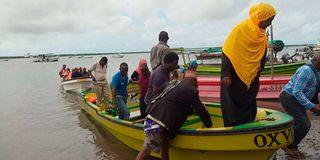Lamu County to train women in boat-building

A woman alights from a boat at the Lamu Jetty. Of the more than 1,000 boat operators in the county, none is a woman.
What you need to know:
- County government of Lamu has introduced an initiative to enrol women in boat-building.
- Governor Fahim Twaha, says the special programme is to equip women with hands-on skills that will enable them to fully engage in boat-building.
- Most boat and dhow craftsmen are the elderly, a situation making the industry fragile.
The Lamu County government has introduced an initiative to enrol women in boat-building to increase their livelihoods.
The boat-making art has been the preserve of men. Of over 1,000 boat-builders on various islands in the archipelago, none is a woman. But this will soon change if everything goes according to plan.
In a statement on International Women’s Day, Governor Fahim Twaha, announced that his administration had sponsored a special programme to equip women, especially young ones, with hands-on skills that will enable them to fully engage in boat-building.
Financial independence
The initiative will also enable the women to gain economic independence, hence breaking the bias. Most of them have had to rely on their husbands for family and personal needs.
“We have continued to provide our women with employable skills through fully county-sponsored courses in local TVETs (Technical and vocational education and training) and we have expanded the curriculum and opened 14 new branches to ensure equal access for all.
“There should be no limits or discrimination whatsoever on the kind of jobs the women here are doing. That’s why we’ve sponsored them to train even in boat-building courses that have always been dominated by men,” said Mr Twaha.
“My administration is focused on social equality, prioritising it for all people. We want a Lamu that believes in or is based on the principle that all people are equal and deserve equal rights and opportunities. We’re committed to that. Together we can break the bias.”
New dawn
Residents and advocacy groups have welcomed the programme.
Lamu Women Alliance Executive Director Raya Famau termed it a new dawn for women and girls who have endured decades of discrimination in terms of education, training, and employment opportunities.
Ms Raya thanked the efforts by the county leadership to untangle women from cultural enslavement.
She expressed confidence that such an initiative will make a breakthrough for the women in the art of boat-making which is currently dominated by men.
She stressed that training and absorbing women into boat-building shall as well help fight gender-based violence amongst families.
According to Ms Raya, women in Lamu have for years been left without any role not only in boat-building but also in boat operation.
The county has more than 5,000 boat operators, but not a single woman works in the vast water transport sector.
“Economic instability escalates gender-based issues. I am happy about the newly introduced training courses for women in Lamu on boat-making-related skills. That means, after all, they will have their own source of income,” said Ms Raya.
“When women get their sustainable source of income, they supplement what the men get, and this reduces dependency, which is a conduit for gender-based violence.”
Preserving skills
The move also comes at a time when the Kenya Maritime Authority (KMA) has expressed concern that the art of dhow- and boat-building in Lamu and the Coast region might become extinct in the future if proper measures are not put in place to sustain it.
KMA chair Geoffrey Mwango noted that most boat and dhow craftsmen are the elderly, a situation making the industry fragile. He appealed to the youth, especially those in Lamu and places like Ngomeni that rely majorly on water transport, to embrace the art for their own good.
“The art of boat- or dhow-making has been left for the elderly, especially here in Lamu. We are worried if the aged die or move out of the county or the Coast, the art will become extinct. As KMA, we’re agitating for a scenario where the youth learn the skills through apprenticeship so that such skills can be transferred from generation to generation,” said Mr Mwango.





